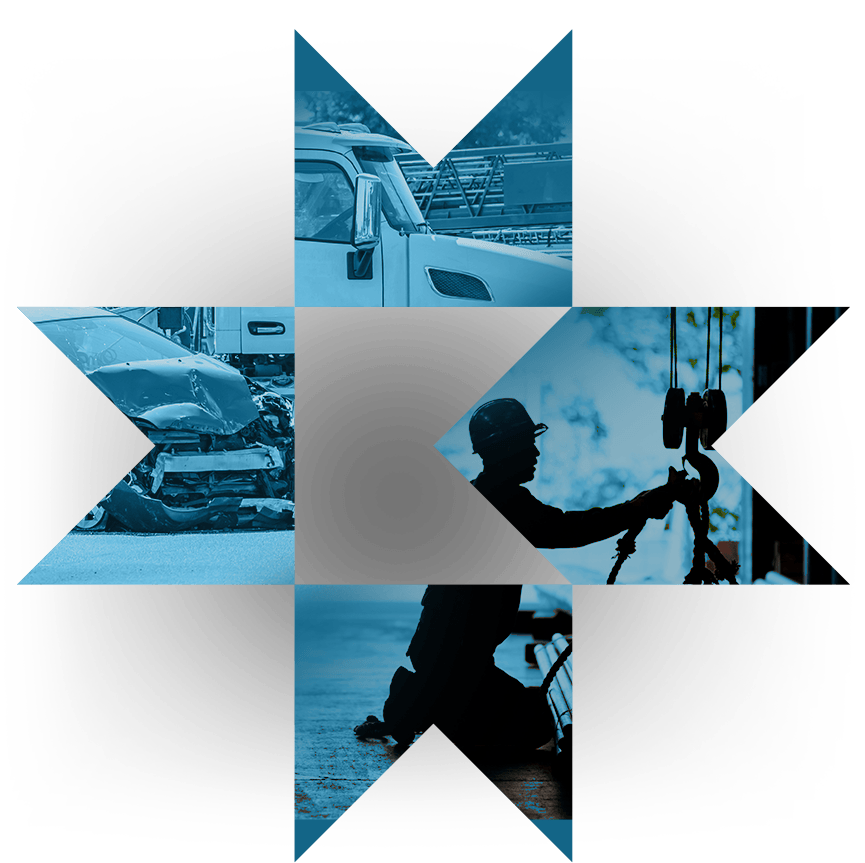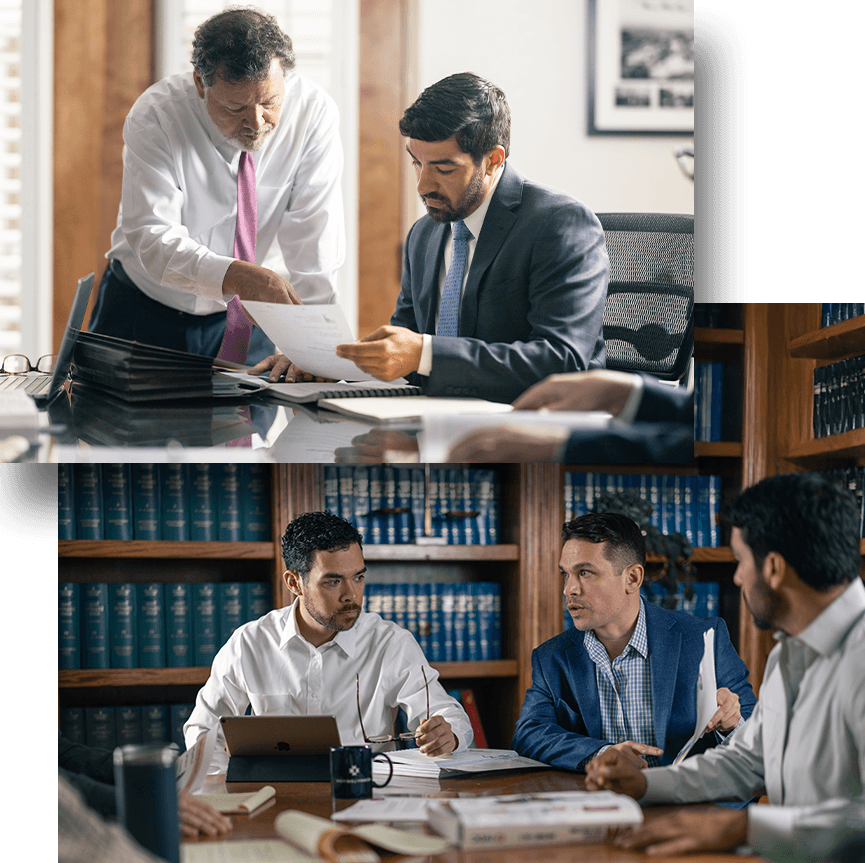


Truck Accident Laws and the Lawsuit Process
Distracted, careless, and impaired truck drivers are a danger to everyone on the road. If you or a family member has been hurt in a truck accident, you need a lawyer experienced in claims like yours – a truck accident law firm with a proven track record of success.
At Kemmy Law Firm, we know truck wrecks often lead to severe physical and psychological injuries. While you are doing your best to recover, your worries and fears are aggravated by the increasing medical expenses, lost wages, and disruptions to your family life. Don’t try to deal with the trucking company and insurance provider yourself. They will try to take advantage of you in any way possible.
You can and should fight back with help from an experienced truck accident law firm. The Kemmy Law Firm has over five decades of combined experience protecting and fighting for injured people, including truck wreck victims. We have secured millions of dollars through settlements and litigation for injured clients.
To talk with us about your truck accident injuries, call (830) 264-6297and schedule a free, no-risk consultation to discuss your truck accident. You owe us nothing unless we win you compensation.
Dangerous Roads in West Texas & New Mexico
Due to their positions adjacent to Mexico, both New Mexico and West Texas see some of the heaviest levels of commercial truck traffic related to product, freight, and industrial transportation. Shipping and oil drilling in the Gulf of Mexico also cause countless big rigs, 18-wheelers, and semi-trucks to cross all parts of Texas; when oil and gas need to head west, the same commercial trucks cross New Mexico. As a result, the roads and highways in West Texas and New Mexico are among the busiest in the country regarding commercial truck traffic—and can also be among the most dangerous.
The three busiest highways for commercial truck traffic and shipping in West Texas and New Mexico are:
- I-10
- I-25
- I-20
Safely driving a commercial truck or 18-wheeler requires intense levels of attention, control, and precision, much more than a typical passenger vehicle, especially when in the middle of busy traffic. If a commercial truck driver makes even a “small” mistake, it can be what causes a big, life-changing accident. Due to the massive weight difference between a commercial truck (up to 80,000 pounds) and a passenger vehicle (around 4,000 pounds on average), the force of an impact in a truck accident will devastate the lighter vehicle. Even if a big rig is traveling at a slow speed, it can cause serious or fatal injuries if it collides with a much lighter passenger vehicle.
To make matters worse and the highways of West Texas and New Mexico even more dangerous, many trucking companies push their truck drivers too far. The employers know the importance of completing routes on one of America’s busiest shipping avenues, so they may encourage truck drivers to break the speed limit, work too many hours without a sleep break, or skip truck maintenance periods, all behaviors that can increase the risk of a truck accident.

We have a saying that goes "When you hire the Kemmy Law Firm, you don't just hire one lawyer, you hire a team of lawyers." Tom Kemmy is an award-winning and board certified personal injury lawyer who has been practicing injury law since 1986. His sons are experienced personal injury lawyers and former prosecutors that represented the State of Texas against murderers, thieves, drug traffickers, and violent criminals. We put our combined experience and knowledge in the pursuit of one goal, to win and obtain maximum justice for our client.

-
$20 MILLION Oil and gas case involving significant economic harm
-
$19.4 MILLION Jury Verdict Wrongful Death of an elderly woman at Assisted Living facility.
-
$13.5 MILLION Jury Verdict Patient paralyzed after nurses failed to tell a doctor about a change in condition
-
$8 MILLION Young college student suffers brain injury from negligent conduct
-
$7.5 MILLION West texas woman becomes brain injured when basic safety rules were not followed
-
$6.2 MILLION Jury Verdict Marine veteran suffers catastrophic harm after a dangerous fall
Truck Accident Damages
New Mexico and Texas truck accident laws might entitle you to compensation for your physical, psychological, and financial injuries, which also are known as damages.
-
Economic Damages
Economic damages are those that are easily quantified by monetary loss. You can demand compensation for your injury-related expenses and losses, including:
- Past and future medical expenses
- Lost wages
- Reduced earning capacity
- Medical supplies for at home
- Transportation costs to and from medical appointments
- Mental health care, such as therapy
-
Non-Economic Damages
Not all injuries after a truck crash are tangible and easily valued. We demand you receive compensation for the following:
- Physical pain and suffering
- Emotional distress
- Mental anguish
- Scarring and disfigurement
- New physical limitations.
-
Punitive Damages
Under both Texas and New Mexico, punitive damages are available only in certain circumstances. We must establish the defendant acted recklessly, maliciously, or fraudulently.
New Mexico does not cap the amount of punitive damages you can receive. Texas caps punitive damages at the greater of two times the amount of economic damages plus an amount equal to any non-economic damages up to $750,000 or $200,000.

Commercial Vehicle Insurance Requirements
Federal law requires commercial trucks to carry a minimum amount of liability insurance based on the size of the truck and the type of cargo it carries.
- For-Hire Interstate General Freight Carriers: $750,000
- For-Hire and Private Carriers of Oil and Certain Types of Hazardous Waste: $1,000,000
- For-Hire and Private Carriers of Other Hazardous Substances: $5,000,000
- For-Hire Passenger Carriers (Seating Capacity ≤15): $1,500,000
- For-Hire Passenger Carriers (Seating Capacity >15): $5,000,000
Commercial trucks that operate purely in Texas or New Mexico must meet the state’s minimum liability insurance requirements, which may differ from the FMCSA regulations.
After you are injured in a crash with a truck, we will investigate the truck driver and trucking company’s insurance coverage. Because most commercial trucks and drivers are covered by liability policies with minimums higher than personal auto coverage, you may have a better chance of receiving a fair settlement.
However, we can never guarantee that you will receive a settlement, which is why we recommend working with an experienced trial attorney who is comfortable and capable in the courtroom.


-
"He far exceeded any of my expectations on my case with a positive outcome."I was involved in a refinery accident and was referred to Kemmy Law Firm. Nicholas Kemmy walked me through the process and took care of all the necessary details. He far exceeded any of my expectations on my case with a positive outcome.- Robert R.
-
"Showed a deep understanding of my personal situation and demonstrated empathy."
Ben Kemmy and his awesome staff showed a deep understanding of my personal situation and demonstrated empathy throughout the legal process. This helped me a great deal to get through this difficult time. I recommend Kemmy Law Firm to all who need the services .
- Jim P. -
"They were so patient and explained everything in detail."
Everyone we worked with was amazing. They were so patient and explained everything in detail. They worked with my mom and then when she passed away the game plan changed and they made sure to explain everything. We were blessed to have them on our team. I would highly recommend them.
- Dora M. -
"They made a difficult situation more at ease by treating us with dignity, grace and like family."
Our child was involved in a serious injury that was unexpected and devastating. Tom and Jac Kemmy were quick, professional and supportive throughout the whole process. They responded to all of our questions and helped in every way possible. They made a difficult situation more at ease by treating us with dignity, grace and like family.
- Harrison L.
Truck Accident Claims Process
There are many steps in the truck accident lawsuit process, including:
When you have been hurt or lost a loved one in a truck wreck, we recommend you retain an experienced personal injury law firm right away.
-
Investigating What Happened
Before we file a lawsuit, we take steps to preserve and collect any evidence available. We obtain a copy of the police accident report. We gather any video footage of the crash or photos of the aftermath. We will contact eyewitnesses and ask for their oral or written statements.
We will use public records to investigate the truck driver and trucking company’s backgrounds.
-
Sending a Preservation LetterWe will send a letter to the trucker, trucking company, and any other party relevant to the crash stating you have a legal claim and that they must preserve any potentially relevant evidence. Without a letter like this, trucking accident evidence tends to disappear quickly. The trucking company may destroy records or the black box that is on many semi-trucks to record what happened before, during, and after a crash.
-
Hiring ExpertsDepending on the facts of your case, we may hire one or more experts right away, including a medical, vocational, financial, economic, accident reconstruction, or trucking expert. An expert’s objective review and analysis of the evidence can provide us with additional support for your claim for compensation.
-
Documenting and Valuing DamagesFrom the very beginning, we will work with you to document your physical, psychological, and financial injuries. To accurately calculate the value of your claim, we need as much evidence as possible regarding the harm you have suffered.
-
Filing a LawsuitOnce we have prepared as thoroughly as possible, we will file the personal injury or wrongful death lawsuit. This enables us to use discovery to gather more evidence, which helps us prepare for settlement negotiations or trial.
-
Negotiating an Insurance Settlement
Most truck accident claims are resolved with an insurance settlement prior to trial. All the previous steps in the claims process are necessary to be prepared for these negotiations. By this point, we have a thorough understanding of what happened, who is responsible, and how much your damages are worth.
We take an aggressive approach to negotiations, and we do not settle for less than your claim is really worth.

All of our clients have families of their own. They are decent, hardworking people, and come to us with complex business issues or because their lives have been changed by a catastrophic injury.

Truck Accident Lawsuits and Trial Preparation
Kemmy Law Firm has over five decades of combined experience handling serious personal injury lawsuits, such as truck wreck cases. And we routinely file lawsuits on our clients’ behalf. This is for several reasons.
- Benefit from the Discovery Phase: Before we enter settlement negotiations, we need to collect and review all available evidence. Much of this evidence is under the truck driver or trucking company’s control. The only way to gain access to it is through the discovery process. Without filing a lawsuit and going through discovery, we could not depose the truck driver, obtain copies of the trucking company’s inspection and maintenance records, or obtain a copy of the truck’s electronic data – all of which can be vital to our case.
- Expert Truck Accident Testimony: In addition to discovery, other important trial preparation steps are hiring experts, like an accident reconstructionist. An objective third-party opinion can be very persuasive if we need to go before a jury.
- Pre-Trial Motions: We also believe in an aggressive motion practice. We utilize pre-trial motions to ask the judge to make important substantive and procedural decisions.
- Filing a Lawsuit Shows We Are Serious: Additionally, filing a truck accident lawsuit shows the insurer we are serious. It proves to the insurer that we are not willing to accept just any low settlement offer. Instead, we are willing to put the defendants and the insurer through the paces to get the best possible outcome for our client.
Physical & Psychological Effects of Truck Accidents
When you or a loved one are involved in a semi or oil truck accident, you may be diagnosed with moderate, serious, or catastrophic injuries. At Kemmy Law Firm, we understand that you may be in pain, angry, and frustrated.
Kemmy Law Firm has worked on truck accident cases involving:
- Severe lacerations
- Broken bones
- Ligament, muscle, and tendon injuries
- Injuries and disfigurements to the face
- Dental injuries
- Vision loss
- Traumatic brain injuries
- Whiplash
- Herniated discs (slipped disc)
- Spinal cord injuries
- Paralysis
- Crush injuries
- Nerve damage
- Amputation
- Internal organ damage
- Fire or chemical burns
An unexpected truck crash is a traumatic event. The crash itself, the medical treatment, and your recovery can negatively impact your psychological wellbeing. Depending on the severity of the crash, you may suffer from post-traumatic stress disorder, which requires medical treatment to manage. You also may develop anxiety, phobia, depression, sleep disorders, and other mental health conditions as a result of the crash and your physical injuries.
Truck Accident Statute of Limitations
There is a deadline, called a statute of limitations, within which you must file a truck accident claim or lawsuit. If you miss this deadline, you forfeit your eligibility for compensation.
The statute of limitations usually begins to run the day of the truck accident or the day of your relative’s passing. However, there are some instances in which the start date may be later than the accident or death, or the clock may be paused.
- Texas’ statute of limitations for personal injury and wrongful death claims is two years.
- New Mexico’s statute of limitations for personal injury and wrongful death claims is three years.
You should talk with a lawyer about whether any laws alter your time limit for filing a truck accident lawsuit. Call (830) 264-6297




